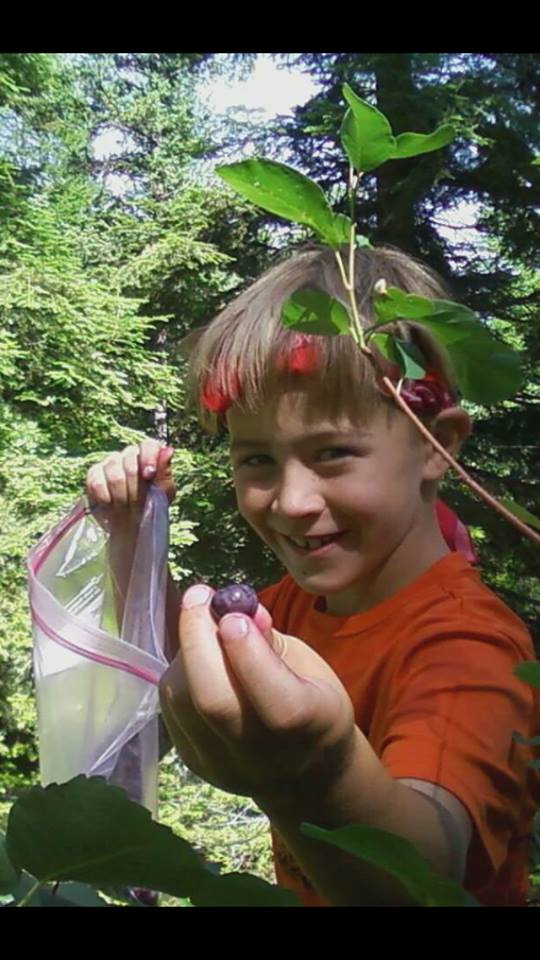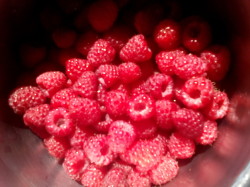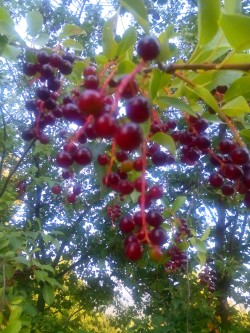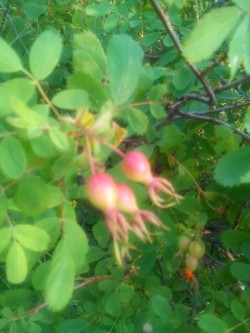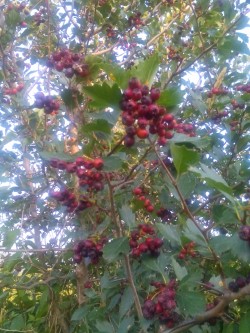I’m visiting family here in beautiful Montana, and we went huckleberry picking up in the mountains. Huckleberries may sound like a fictitious fruit, but the truth is they do exist and are absolutely wonderful tasting. I’ve loved these berries (like blueberries but larger and more delicious) since I was a kid and am immensely looking forward to eating as much as I can of this delicious wild fruit!
Since huckleberries have not been domesticated and are found in Montana, Idaho, Alaska, Canada, and other parts of the Pacific Northwest, it’s a real treat to be able to enjoy them–and do it for free (I was at a fruit stand and 1 pound of huckleberries is $12.00!). Huckleberries are a nutritional goldmine, containing more antioxidants than the ever popular blueberry. In fact, one serving of wild huckleberries has more antioxidant power than any other fruit or vegetable except lingon berries! Huckleberries are high in iron, have more calcium than blueberries, and has a high vitamin C content, which is essential for good health. Clinical studies have also shown huckleberries aid in supporting eye health, especially in diabetics.
It’s a little like Easter, only much more productive (plus healthy and delicious)–you needn’t look very hard once you’ve found a patch of huckleberry bushes. They are large and purple, with a very sweet yet tart distinct flavor. One must be on the lookout for bears since they too love huckleberries, but it’s also a possibility to run into a Grizzly at any point around here (large ones have been spotted on my Grandparents’ property, not more than 200 feet from the house).
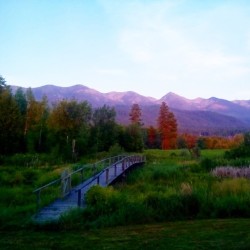
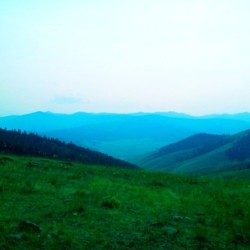 (Yes, this is what I’m dealing with here 😉 )
(Yes, this is what I’m dealing with here 😉 )
In truth, I was a bit worried about coming up here as a vegan, but I’ve never eaten so well for free! My Uncle Peter lives right next door to a cherry orchard and has let me in to pick the fantastically fresh and sweet “pollinator” cherries, which taste better and typically are not sold (pictured are Ranier cherries; the pollinator cherries were the red kind). My grandma has a larger-than-life raspberry patch growing in her garden, and every morning my sister and I have gone out picking a breakfast feast.
Not only that, but there are wild edible plants here for me to experiment with and eat on hikes–the ultimate convenience food if you ask me! There are pin cherries, rose hips, hawthorne berries, and what feels like a million more species of edible plants right in the backyard. It’s truly amazing and I feel blessed in my ability to explore these completely natural foods and spend my time here in breathtaking Montana.
Pin cherries are also called fire cherries or bird cherries. These wild cherries are high in Vitamin C and can be made into jam, juice, breakfast syrup, jelly, etc.
Rose hips are the fruits of the rose plant, located just below the petals, and is a Vitamin C powerhouse. You pick the rose hips after the petals have fallen off. You can make tea, jam, or soups with fresh rose hips–or you can blend it in water and drink it raw, which retains the vitamins the best. Rose hip is great for your skin, acne, digestive issues, or weakened immune system.
Hawthorn berries have been prized for their medicinal properties, especially against congestive heart failure, chest pain, and high blood pressure. In fact, they have been used to treat heart disease since 1st century C.E. The leaves, berries, and flowers of hawthorn berries are used to make medicinal tea.
Do you love foraging for wild berries? What kind of wild plants have you tried?
Related: Foraging Fun – Chicken of the Woods
Making Your Own Wild Root Brew
Healing Ingredients: Magic of Mushrooms
Also by Jessica Ferguson: Vegan Steamed Bun
__
Photo: Jessica Ferguson

